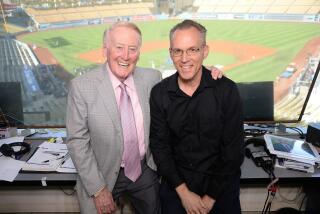Q&A: Jim Abbott, former Angels and Yankees pitcher
Jim Abbott made a lasting impression not only on Angels fans, but also those who celebrate a validation of the human spirit.
Born without a right hand, Abbott won a gold medal with the 1988 U.S. Olympic baseball team, was a first-round draft pick, won 54 games for the Angels in 1989-92 and 1995-96 stints and threw a no-hitter for the New York Yankees in 1993.
Abbott, who is now 44 and resides in Southern California, and former Times and current Yahoo Sports baseball writer Tim Brown have produced an autobiography of the pitcher’s journey: “Imperfect: An Improbable Life,” due in bookstores on April 3.
Brown noted that beyond Abbott’s accomplishments, “why he’s choosing to tell his story” is appetizing. “It wasn’t ever easy. The later years,” including a 2-18 record with the Angels in 1996, “really tore at him. Some very dark moments.”
Here is what Abbott had to say.
Why’d you write the book?
I’ve been approached for a long time to write a book.... When I was playing, I was focused on being the best pitcher I could be. Being removed now, and to reflect on my experiences on and off the field, I thought I could answer the questions people have about me while taking an honest look at missing a right hand and how baseball helped me to overcome that.… We set off to try and do something good.
What did we as reporters miss about you, or what did you not open up about, during your career that you do in the book?
I never fully opened up about my motivations and growing up different. I used baseball as a way to move past that, to hide from being different. As my story became well-known, that was easier to do — to use baseball as a cover. What writing the book taught me is that the trials and tribulations of my career helped me deal with my hand. Losing games, then having baseball taken away from me, forced me to open up and explore my loss. The book is not all serious, deep reflection, though. It is meant to also share the positives of my career.
There were many. This isn’t a question, but I think most people remember you as the inspirational, happy spirit who won games in Anaheim and threw the no-hitter in New York.
I appreciate that, and it was a motivation to take a look back at all the great things: pitching at Michigan, winning the gold medal, coming to the Angels so quickly. There was so much material to draw upon. I loved the process of the book. Tim tracking down [ex-manager Doug] Rader, [pitcher Bert] Blyleven, [then-owner Jackie] Autry, [pitching coach Marcel] Lachemann, [pitcher Kirk] McCaskill. Those stories, I think, [are] one of the strong parts of the book.
But you had dark moments, especially as your career ended?
I had one of the worst years in the history of pitching, in 1996 [7.48 earned-run average, 78 walks, 58 strikeouts]. This doesn’t hide from that. It takes it all into account. How do you deal with the hard moments? It was tough. The decline in my performance was happening at an age where pitchers should have more years. It didn’t make sense. It was incredibly difficult, because baseball had been such a big part of me. To face life without that was scary. It took a long time to adjust. I took a year off [after 1996] and did all the things I thought I should do: bought a boat, had summer with my family. But I still missed it quite a bit. So I tried out for the White Sox and was in Hickory, N.C.; Winston-Salem; Alabama; Calgary. That journey helped me to find the love of the game again. Even though I knew I was near the end. It made me feel better.
What made leaving the game so tough?
All your eggs are in one basket.
Really? It seems as if you’d have one of the best opportunities to move into motivational speaking.
I was encouraged to do that. I didn’t know at the time if I could do it. It took me awhile to find my footing with that. It’s now become an incredibly rewarding aspect of my life. You go places far away and give a speech to people and people take something away from that. The transition to speaking was a spark for the book: What did I learn from this? How does this all come together? Let’s see if we can write this down.
How does it all come together?
The book is centered around the no-hitter, weaving that in with the memories. Tim was brilliant with that. From the first through the ninth innings, there were ups and downs in the game. I walked five guys. I got hit hard. It wasn’t a perfect game. But that game was almost a metaphor for my life. It wasn’t perfect, but it was great — filled with anxiety, hopefulness and triumph all combined. That’s how it ends up: acceptance. And pride.
twitter.com/latimespugmire
More to Read
Go beyond the scoreboard
Get the latest on L.A.'s teams in the daily Sports Report newsletter.
You may occasionally receive promotional content from the Los Angeles Times.











